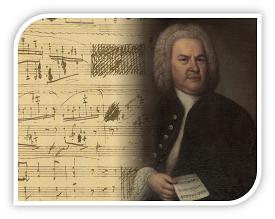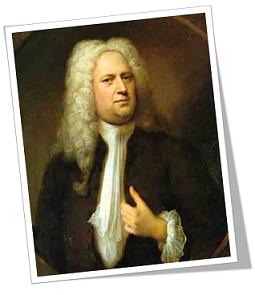The Tercentenary of Bach & Handel: J.J. and S.D.G.
The Tercentenary of Bach & Handel: J.J. and S.D.G.
Two renowned Christian musicians were born 300 years ago and eighty miles apart: Johann Sebastian Bach (1685-1750) and George Frideric Handel (1685-1759). The two never met. Their worlds were very different. Yet both were profoundly moved by the amazing grace of God in Jesus Christ to needy sinners.
Bach belonged to a family which had distinguished itself through musical talent for several generations. He was orphaned at ten, and had to provide for his own education from the age of thirteen. When only 18, he was appointed court-musician in Weimar, a position he retained until 1717. During this period Bach composed short religious pieces, organ works, and cantatas. At 38 he was made cantor and director of church music at Leipsic, where he remained for the rest of his life. During this latter period he composed deeply religious works, including the St. John Passion (1723), St. Matthew Passion (1729), and lengthy church cantatas. Throughout his life,  Bach harmonized over 370 chorales, and wrote nearly 300 cantatas, beautifully combining subjectivity and the proclamation of objective wrath and grace. During his life, he was known primarily for his skill as an organist and pianist; his compositions went largely unnoticed until the time of Felix Mendelssohn, who reproduced his St. Matthew Passion in an 1829 centennial performance. Bach societies became popular from about 1850 when his compositions came into widespread recognition.
Bach harmonized over 370 chorales, and wrote nearly 300 cantatas, beautifully combining subjectivity and the proclamation of objective wrath and grace. During his life, he was known primarily for his skill as an organist and pianist; his compositions went largely unnoticed until the time of Felix Mendelssohn, who reproduced his St. Matthew Passion in an 1829 centennial performance. Bach societies became popular from about 1850 when his compositions came into widespread recognition.
Bach was no stranger of the life of grace. His 295 church cantatas have been called "sermons in song." The same themes of grace in Christ and wrath outside of Christ are interwoven from the first one written at Mulhousen in 1707 ("From the deep, Lord") until the last composed at Leipzig in 1744 ("Thou Prince of Peace, to Thee we Bow"). At the beginning of a song, he usually wrote, "J.J." (Jesu juva, "Help me, Jesus"), while at the end he commonly noted, "S.D.G." (Soli Dea Gloria, "To God Alone be Glory"). Nearly all of his cantatas were based on scriptural text.
Bach's life of faith is also evident through his 61 marginal notes left behind in a personal Bible which regularly testify of God-centered foundations. Beside 1 Chronicles 25, for example, Bach noted: "This chapter is the true foundation of all church music pleasing to God."
Bach suffered from failing eyesight most of his life; an eye operation six months before his death resulted in his becoming totally blind. Nevertheless, he continued composition until the last day of his life. His goal was to finish his last work which was to contain eighteen chorales. After finishing fifteen of them, he suffered a stroke and was compelled to remain in bed. Despite considerable pain, he dictated the sixteenth number. His son-in-law, taking the dictation, urged him to stop.
But Bach continued. Painfully he dictated the seventeenth, titled, Come Holy Ghost Creator Blest. The last and eighteenth came more easily. It began with, When in the hour of utmost need ... and it ends like this:
Before Thy throne, my God, I stand;
Myself, my all, are in Thy hand;
Turn to me Thine approving face,
Nor from me now withhold The grace.Grant that my end may worthy be,
And that I wake Thy face to see,
Thyself for evermore to know!
Amen, Amen, God grant it so!A second English translation puts it like this:
Before Thy throne I now appear,
O Lord, bow down Thy gracious ear
To me, and cast not from Thy face
Thy sinful child that sues for grace.Grant that in peace I close mine eyes,
But, on the last day, bid me arise,
And let me see Thy face for e'er.
Amen, Amen! Lord, hear my prayer!
Early that evening, Bach's final number was fulfilled. Eternally he may enjoy the harmonious notes of heaven. He both lived and died, and shall forever live, his own confession: "The sole object of all music should be the glory of God and pleasant recreation."
Christian News has aptly summed, "Bach was first and foremost an orthodox Christian whose life's motto required that he do all his work 'in Jesus' name' and 'to the glory of God.' Even when not in direct service to the Church, he nevertheless took for granted that he was serving God. Bach did not distinguish between a sacred and secular calling in life. His life gave evidence he agreed with Luther when he insisted that all honorable service glorified God. Bach thus showed that he was in truth a member of God's royal priesthood."
George Handel was born in Halle, but spent most of his life in England as a favorite composer of the Hanoverian dynasty, dying there in 1759. He was the son of a well-to-do barber/surgeon, who wanted him to become a lawyer. By his early 20's, however, he had foregone law to study and compose in Italy, where he came in contact with many of Europe's most influential musicians. By age 27 he had migrated to London, where he established himself as the favorite composer to English royalty.
 Handel is best known for his 31 oratorios, which include Esther (1720), Saul (1739), Israel in Egypt (1739), Samson (1743), Jephthah (1752), and, above all, The Messiah, first performed in Dublin in 1742 – all of which were based on biblical text. As Bach has been called the preacher in music, Handel has been called the storyteller of Scripture in music. Handel also wrote many operas, concerti, suites, and other works, the bulk of which were religious in character. Like Bach, he grew blind near the end of his life.
Handel is best known for his 31 oratorios, which include Esther (1720), Saul (1739), Israel in Egypt (1739), Samson (1743), Jephthah (1752), and, above all, The Messiah, first performed in Dublin in 1742 – all of which were based on biblical text. As Bach has been called the preacher in music, Handel has been called the storyteller of Scripture in music. Handel also wrote many operas, concerti, suites, and other works, the bulk of which were religious in character. Like Bach, he grew blind near the end of his life.
Handel's religious experience is not as clear as Bach's as so little is known of it. When about fifty, he reached a low point in his life, having become partially paralyzed and nearing bankruptcy. He walked through the streets of London, crying in his heart, according to his own testimony, "My God, my God, why hast Thou forsaken me?" In the early hours of one morning, after having walked the streets of London all day and most of the night in such spiritual depression, he went back to his room and found a package sent to him with the request to set some words to music. For seventeen straight hours Handel wrote. The Lord graciously removed His darkness. He was given, as it were, a fresh start, and today we recognize primarily his subsequent achievements, especially the climatic Hallelujah Chorus. We may hope that Handel, like Bach, was familiar with J.J., and S.D.G.
The legacy of Bach and Handel is not to be despised. Three of our Psalters were arranged from Handel (#62, 354, 406). Today we may still enjoy their music in its unashamed Bible-centeredness. But above all, may we come to enjoy and know the Master Musician – Jesus Christ, for it is the theme of this Master's music that we need ingrafted experientially into our never-dying souls. We need to become and remain part of that privileged audience included in the rendering of Christ's eternal masterpiece as recorded in Hebrews 2:12, "In the midst of the church will I sing praise to Thee."
We too need to understand: J.J. and S.D.G.!

Add new comment